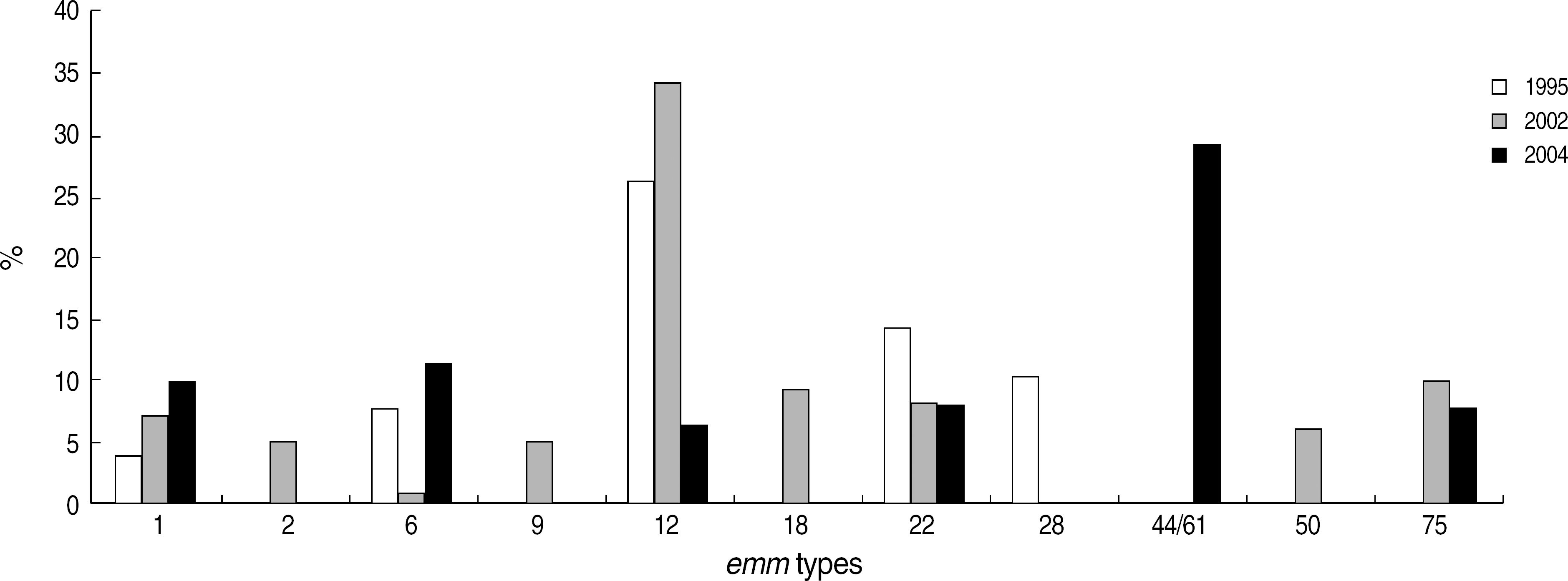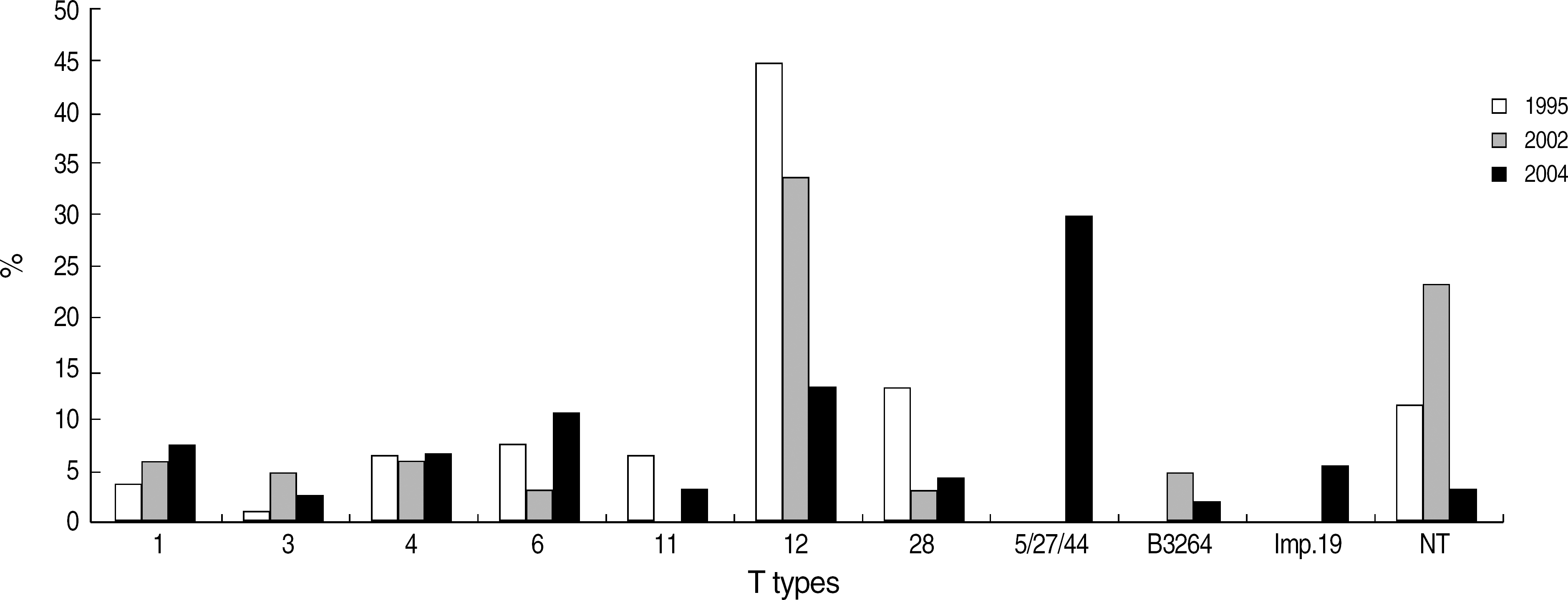Abstract
Background
T antigens and emm genotypes are useful markers for epidemiologic investigation of Streptococcus pyogenes infections. Epidemiologic studies of S. pyogenes were performed on a large scale in Jinju. This was the third study being carried out in the same area over the past 10 years.
Methods
A total of 328 S. pyogenes were isolated from throat cultures obtained from asymptomatic schoolchildren in the Jinju area in 2004. T typing was performed by a slide agglutination, and emm genotyping by PCR and DNA sequencing. We compared the results of this study with those of the previous ones performed in 1995 and 2002.
Results
T5/27/44 were the most prevalent, accounting for 29.6% of all isolates; T12 and T6 were 13.4% and 10.7%, respectively, and T nontypeable was 3.4%. The emm44/61 type was the most prevalent accounting for 29.3%, and emm6 and emm1 were 11.6% and 9.8%, respectively.
Conclusions
Newly recognized T5/27/44 and emm44/61 were the most prevalent, accounting for about 30% of all isolates, while T12 and emm12 were significantly decreased in 2004 compared to the results of previous years. This study demonstrated divergent features of S. pyogenes epidemiology over the past 10 years in the Jinju area.
References
1. Johnson DR, Stevens DL, Kaplan EL. Epidemiologic analysis of group A streptococcal serotypes associated with severe systemic infections, rheumatic fever, or uncomplicated pharyngitis. J Infect Dis. 1992; 166:374–82.

2. Inagaki Y, Konda T, Murayama S, Yamai S, Matsushima A, Gyobu Y, et al. Serotyping of Streptococcus pyogenes isolated from common and severe invasive infections in Japan, 1990–5: implication of the T3 serotype strain-expansion in TSLS. Epidemiol Infect. 1997; 119:41–8.
3. Ivarsson R, Christensen P. T-typing of group A streptococci from clinical specimens: restriction of the number if implied M types in each T-pattern by tests for opacity factor and nicotinamide adenine dinucleotide glycohydrolase. Acta Pathol Microbiol Scand. 1977; 85:235–7.
4. Caparon M, Scott J. Identification of a gene that regulates expression of M protein, the major virulence determinant of group A streptococci. Proc Natl Acad Sci USA. 1987; 84:8677–81.

5. Kim SJ, Kim EC, Cha SH, Kaplan EL. Comparison of M-serotypes of Streptococcus pyogenes isolated from healthy elementary school children in two rural areas. J Korean Med Sci. 1996; 11:133–6.
6. Cha SH, Park YH, Suh JT, Johnson D. Serotyping of group A streptococci isolated from healthy school children and patients with pharyngotonsillitis. Korean J Infect Dis. 1998; 30:19–23.
7. Prakash K, Lakshmy A. Streptococcal throat carriage in school children with special reference to seasonal incidence. Southeast Asian J Trop Med Public Health. 1992; 23:705–10.
8. Lee KY. Seasonal incidence of streptococcal carriers in school children in Korea and its correlationship with streptococcal diseases. Yonsei J Med Sci. 1974; 7:126–38.
9. Whatmore AM, Kapur V, Musser JM, Kehoe MA. Molecular population genetic analysis of the enn subdivision of group A streptococcal emm-like genes: horizontal gene transfer and restricted variation among enn genes. Mol Microbiol. 1995; 15:1039–48.
10. Kaplan EL. The group A streptococcal upper respiratory tract carrier state: an enigma. J Pediatr. 1980; 97:337–45.

11. Beall B, Facklam R, Thompson T. Sequencing emm-specific PCR products for routine and accurate typing of group A streptococci. J Clin Microbiol. 1996; 34:953–8.
12. Kiska DL, Thiede B, Caracciolo J, Jordan M, Johnson D, Kaplan EL, et al. Invasive group A streptococcal infections in North Carolina: epidemiology, clinical features, and genetic and serotype analysis of causative organisms. J Infect Dis. 1997; 176:992–1000.

13. Colman G, Tanna A, Efstratiou A, Gaworzewska ET. The serotypes of Streptococcus pyogenes present in Britain during 1980–1990 and their association with disease. J Med Microbiol. 1993; 39:165–78.
14. Parker MT. International survey of the distribution of serotypes of Streptococcus pyogenes (group A streptococci). Bull World Health Organ. 1967; 37:513–27.
15. Kim SJ, Maeng KY, Lee HI, Cho YK, Yun HS. Bacteriological survey of beta-hemolytic streptococci from the throats of elementary school children in Jinju. Korean J Pediatr. 1996; 39:238–45.
16. Kim SJ. Epidemiological surveillance of group A streptococci isolated from school children using emm genotyping. Korean J Lab Med. 2002; 22:417–23.
17. Kaplan EL, Johnson DR, Nanthapisud P, Sirilertpanrana S, Chumdermpadetsuk S. A comparison of group A streptococcal serotypes isolated from the upper respiratory tract in the USA and Thailand: implications. Bull World Health Organ. 1992; 70:433–7.
18. Maxted WR, Widdowson JP, Fraser CA, Ball LC, Bassett DC. The use of the serum opacity reaction in the typing of group A streptococci. J Med Microbiol. 1973; 6:83–90.
19. Dicuonzo G, Gherardi G, Lorino G, Angeletti S, De Cesaris M, Fiscarelli E, et al. Group A streptococcal genotypes from pediatric throat isolates in Rome, Italy. J Clin Microbiol. 2001; 39:1687–90.

20. Bessen DE, Carapetis JR, Beall B, Kats R, Hibble M, Currie BJ, et al. Contrasting molecular epidemiology of group A streptococci causing tropical and nontropical infections of the skin and throat. J Infect Dis. 2000; 182:1109–16.

21. Mencarelli M, Corbisiero R, Padula MG, Galgani I, Stolzuoli L, Cellesi C. Group A streptococcal infections: trend and strain emm typing in an area of central Italy, 1985–2002. Epidemiol Infect. 2005; 133:1107–11.
Fig. 2.
Change of distribution of emm types of Streptococcus pyogenes in Jinju between 1995–2004. M typing instead of emm typing was performed in 1995.

Table 1.
Distribution of T types of Streptococcus pyogenes in 2004
| T types | N (%) of isolates |
N (%) of isolates in each elementary school |
|||
|---|---|---|---|---|---|
| Munsan | Gumsan | Manggyeong | Chunjun | ||
| 5/27/44 | 97 (29.6) | 11 (14.7) | 18 (17.3) | 49 (44.1) | 19 (50.0) |
| 12 | 44 (13.4) | 11 (14.7) | 27 (26.0) | 6 (5.4) | 0 (0) |
| 6 | 35 (10.7) | 11 (14.7) | 10 (9.6) | 7 (6.3) | 7 (18.4) |
| 1 | 25 (7.6) | 11 (14.7) | 5 (4.8) | 7 (6.3) | 2 (5.3) |
| 4 | 22 (6.7) | 3 (4.0) | 7 (6.7) | 12 (10.8) | 0 (0) |
| Imp.19 | 18 (5.5) | 4 (5.3) | 4 (3.9) | 10 (9.0) | 0 (0) |
| 28 | 15 (4.6) | 7 (9.3) | 6 (5.8) | 2 (1.8) | 0 (0) |
| 25 | 13 (4.0) | 1 (1.3) | 8 (7.7) | 2 (1.8) | 2 (5.3) |
| 11 | 10 (3.1) | 1 (1.3) | 2 (1.8) | 4 (3.6) | 3 (7.9) |
| 2 | 9 (2.7) | 5 (6.7) | 1 (1.0) | 2 (1.8) | 1 (2.6) |
| 3 | 9 (2.7) | 1 (1.3) | 7 (6.7) | 1 (0.9) | 0 (0) |
| 5 | 8 (2.4) | 5 (6.7) | 0 (0) | 2 (1.8) | 1 (2.6) |
| B3264 | 7 (2.1) | 1 (1.3) | 3 (2.9) | 2 (1.8) | 1 (2.6) |
| Others* | 5 (1.5) | 1 (1.3) | 1 (1.0) | 2 (1.8) | 1 (2.6) |
| Nontypeable | 11 (3.4) | 2 (2.7) | 5 (4.8) | 3 (2.7) | 1 (2.6) |
| Total | 328 | 75 | 104 | 111 | 38 |
| (100.0) | (100.0) | (100.0) | (100.0) | (100.0) | |
Table 2.
Distribution of emm types of Streptococcus pyogenes in 2004
| emm types | N (%) of isolates |
N (%) of isolates in each elementary school |
|||
|---|---|---|---|---|---|
| Munsan | Gumsan | Manggyeong | Chunjun | ||
| 44/61 | 96 (29.3) | 6 (8.0) | 20 (19.2) | 51 (46.0) | 19 (50.0) |
| 6 | 38 (11.6) | 12 (16.0) | 10 (9.6) | 7 (6.3) | 9 (23.7) |
| 1 | 32 (9.8) | 15 (20.0) | 8 (7.7) | 7 (6.3) | 2 (5.3) |
| 22 | 27 (8.2) | 8 (10.7) | 15 (14.4) | 3 (2.7) | 1 (2.6) |
| 75 | 26 (7.9) | 3 (4.0) | 10 (9.6) | 11 (9.9) | 2 (5.3) |
| 12 | 21 (6.4) | 5 (6.7) | 12 (11.5) | 4 (3.6) | 0 (0) |
| 5 | 13 (4.0) | 13 (17.3) | 0 (0) | 0 (0) | 0 (0) |
| 49 | 13 (4.0) | 0 (0) | 4 (3.9) | 8 (7.2) | 1 (2.6) |
| 77 | 10 (3.0) | 3 (4.0) | 5 (4.8) | 1 (0.9) | 1 (2.6) |
| 71 | 9 (2.7) | 0 (0) | 5 (4.8) | 4 (3.6) | 0 (0) |
| 3 | 8 (2.4) | 1 (1.3) | 7 (6.7) | 0 (0) | 0 (0) |
| Others* | 32 (9.8) | 9 (12.0) | 8 (7.7) | 12 (10.8) | 3 (7.9) |
| Nontypeable | 3 (0.9) | 0 (0) | 0 (0) | 3 (2.7) | 0 (0) |
| Total | 328 (100.0) | 75 (100.0) | 104 (100.0) | 111 (100.0) | 38 (100.0) |




 PDF
PDF ePub
ePub Citation
Citation Print
Print



 XML Download
XML Download